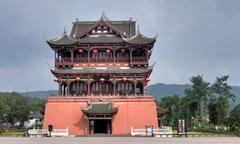Zhaojue Temple Chengdu: Visiting Hours, Tickets, and Guide to a Historical Buddhist Landmark
Date: 03/07/2025
Introduction
Zhaojue Temple (昭觉寺), situated in the northern part of Chengdu, Sichuan Province, stands as one of China’s most venerable and influential Buddhist sites. Founded during the Tang Dynasty (627–649 CE), it has served as a pivotal center for Chan (Zen) Buddhism and remains a living testament to the region’s spiritual, architectural, and cultural heritage. Known as the “First Zen Forest in Western Sichuan,” Zhaojue Temple combines serene landscapes, ancient architecture, and vibrant religious traditions, making it a must-visit for pilgrims, scholars, and tourists alike.
This guide provides an in-depth overview of Zhaojue Temple’s history, religious significance, architectural features, visiting hours, ticketing information, accessibility, and nearby attractions. Whether your interest lies in Buddhist history, cultural exploration, or spiritual reflection, this article will help you plan and make the most of your visit.
For additional resources, refer to Favorstoy, Deep China Travel, and China Highlights.
Table of Contents
- Introduction
- Historical Overview
- Architectural Layout and Highlights
- Religious and Cultural Significance
- Visiting Zhaojue Temple
- Nearby Attractions
- Frequently Asked Questions (FAQ)
- Conclusion
- References
Historical Overview
Tang Dynasty Origins
Established during the Zhen Guan era of the Tang Dynasty, Zhaojue Temple was originally named Jianyuan Temple. It earned its current name after being renamed by Emperor Xuanzong, reflecting imperial recognition and its elevated status within the Buddhist community (favorstoy.com). By the late Tang, it had already become renowned as the “First Zen Forest in Western Sichuan,” signifying its central role in the spread of Chan (Zen) Buddhism.
Development Through Later Dynasties
Over the centuries, Zhaojue Temple underwent multiple restorations and expansions, particularly during the Song, Yuan, Ming, and Qing dynasties. Each era contributed to the temple’s evolving architectural style and spiritual reach. In the Qing Dynasty, significant reconstruction occurred under the guidance of monk Po Shan, with Emperor Kangxi bestowing an honorary plaque in 1703 (chengduprivatetour.com). Despite periods of decline and damage, including during the Cultural Revolution, dedicated restoration has preserved its grandeur and authenticity (China Highlights).
Architectural Layout and Highlights
Main Structures
Zhaojue Temple’s design adheres to the traditional Chinese monastic layout, organized along a central north-south axis. The main structures you will encounter include:
- Mountain Gate (Shanmen, 山门): The grand entrance, featuring ornate wooden carvings and the temple’s inscribed name.
- Octagonal Pavilion: An architectural highlight with classic design elements, serving as an introduction to the temple’s main axis.
- Hall of Heavenly Kings (Tianwang Hall, 天王殿): Houses statues of Maitreya Buddha and the Four Heavenly Kings; preceded by a historic stone bridge.
- Mahavira Hall (Daxiong Baodian, 大雄宝殿): The temple’s spiritual center, enshrining statues of Vairocana, Shakyamuni, and Amitabha Buddhas, as well as Eighteen Arhats.
- Guanyin Pavilion: Dedicated to the Bodhisattva of Compassion, known for its tranquil ambiance.
- Nirvana Hall: Commemorates the Buddha’s passing into nirvana.
- Sutra Library (Cangjing Lou, 藏经楼): Safeguards ancient Buddhist scriptures and texts.
- Arhat Hall: Features 500 life-sized Arhat statues with expressive detail.
- Bell and Drum Towers: Mark time and summon the monastic community.
- Free Life Pond: Used for ceremonial animal releases and reflection.
The temple is also enveloped by age-old cypress and gingko trees, some over 500 years old (Travel China Guide; chinatripedia.com).
Artistic and Natural Features
- Thousand-Armed Guanyin: A remarkable wooden statue symbolizing boundless compassion (Deep China Travel).
- Millennium-old Tree and Stele: A celebrated tree growing around a stone stele, representing the harmony of nature and history.
- “Tree King of Tianfu”: A venerable Huangjue tree, a local natural wonder (chinawiki.net).
- Murals and Decorative Motifs: Walls and halls are adorned with intricate murals, calligraphy, and symbolic motifs such as lotus flowers and auspicious animals.
Religious and Cultural Significance
Chan (Zen) Buddhism Center
Zhaojue Temple has long been a cradle of Chan (Zen) Buddhism, producing eminent monks and scholars whose teachings reached across China and into Japan and Southeast Asia. The temple’s spiritual lineage includes Zen Master Yuanwu Keqin, author of the influential “Blue Cliff Record” (Deep China Travel).
Rituals, Festivals, and Artistic Heritage
- Daily Practices: Visitors can observe or respectfully participate in morning chanting and incense offerings.
- Major Festivals: The temple celebrates Buddhist festivals such as Lunar New Year and Vesak, featuring lantern displays, communal prayers, and cultural performances.
- Cultural Influence: Zhaojue Temple has inspired artists like Zhang Daqian and played a role in developing the Japanese tea ceremony through its Zen heritage.
Visiting Zhaojue Temple
Visiting Hours & Ticketing
- Opening Hours: Generally open daily from 08:00 to 17:00, though some sources cite slightly extended hours in peak seasons (chinadragontours.com).
- Tickets: Entrance fees typically range from 2 RMB to 30 RMB, depending on the season and ongoing events. Discounts are available for students and seniors; tickets are purchased onsite.
Directions & Accessibility
- Location: No. 333 Zhaoqing Road, Chenghua District, Chengdu, Sichuan, China.
- By Metro: Take Line 3 to Chengdu Zoo Station (动物园站), then walk 700 meters south to the temple (chinatripedia.com).
- By Bus: Numerous routes serve Zhaojue Temple Stop (昭觉寺公交站).
- By Taxi/Rideshare: Convenient and affordable from anywhere in Chengdu.
- Accessibility: Main paths are wide and mostly flat; wheelchair access is available to primary halls, though some historic sections require navigation of steps (Deep China Travel).
On-site Facilities & Etiquette
- Amenities: Vegetarian restaurant, meditation halls, clean restrooms, and rest areas.
- Incense: Complimentary incense provided at the entrance; additional offerings available inside.
- Dress Code: Modest attire is expected; cover shoulders and knees.
- Photography: Permitted in outdoor areas; restricted in prayer halls—look for posted signs and ask staff if unsure.
- Behavior: Maintain silence in sacred spaces, refrain from disrupting ceremonies, and be respectful to monks and worshippers.
- Caution: Avoid fortune tellers outside the temple, as their services are unofficial and often unreliable (chinatripedia.com).
Nearby Attractions
- Chengdu Zoo: Located adjacent to the temple, ideal for family visits.
- Wenshu Monastery, Daci Temple, Qingyang Palace: Other significant temples and religious sites in Chengdu.
- Shengxianhu Park, Erxianqiao Park, Sandongqiao Park: Nearby green spaces for relaxation.
Frequently Asked Questions (FAQ)
Q: What are the temple’s opening hours?
A: Open daily from 08:00 to 17:00.
Q: How much is the entrance fee?
A: Ticket prices range from 2 RMB (general admission) up to 30 RMB during festivals or special events.
Q: Is the temple wheelchair accessible?
A: Main halls and paths are accessible, though some older sections have steps.
Q: Can I participate in rituals?
A: Visitors may respectfully observe or join in daily chanting and incense offerings.
Q: Are guided tours available?
A: English-language guided tours can be booked onsite or through local tour operators.
Q: Is photography allowed?
A: Yes, in outdoor areas; refrain from photographing inside sacred halls unless permitted.
Q: What’s the best time to visit?
A: Spring and autumn offer pleasant weather and picturesque temple gardens.
Conclusion
Zhaojue Temple is a jewel among Chengdu’s historical and spiritual landmarks, offering visitors a blend of ancient heritage, architectural splendor, and vibrant religious life. Its accessible location, affordable entry, and proximity to other major attractions make it a convenient and rewarding destination for all. Whether you seek spiritual enrichment, cultural exploration, or peaceful retreat, Zhaojue Temple promises an unforgettable experience.
For more travel inspiration and practical tips, download the Audiala app and follow us on social media for updates on Chengdu’s cultural heritage and guided tours.
References and Further Reading
- Zhaojue Temple: A Historical and Visitor’s Guide to One of Chengdu’s Premier Buddhist Sites, Favorstoy
- Cultural and Religious Significance of Zhaojue Temple: Visiting Hours, Tickets, and Guide to Chengdu Historical Sites, Deep China Travel
- Exploring Zhaojue Temple: Architecture, Visiting Hours, and Tips for Chengdu’s Historic Buddhist Site, China Highlights
- Zhaojue Temple Visiting Hours, Tickets, and Guide to Chengdu Historical Sites, China Dragon Tours
- Zhaojue Temple Chengdu Ticket Price, Opening Hours, Location, and Highlights, Chinatripedia
- Zhaojue Temple, Sichuan Travel Guide

